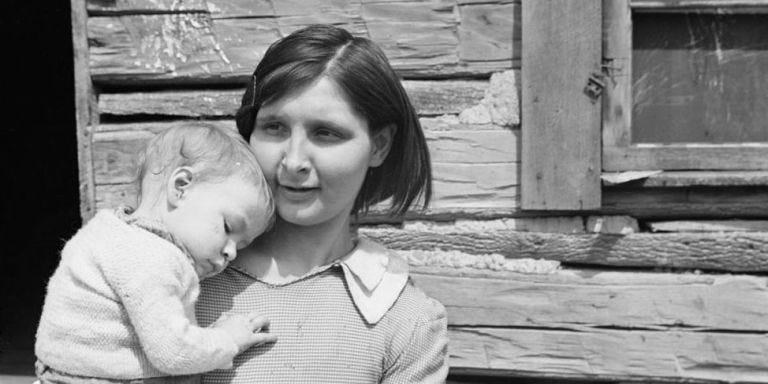
In the preface to Little Heathens, her memoir of growing up in Iowa during the deep recesses of the American Depression, Mildred Armstrong Kalish, says one of her earliest memories is her Grandma Urmy strong-arming Mildred's little sister Avis, then about a year old, right out of Avis's mother's arms while she was nursing, sending the child into some endless wailing.
"Let her cry!" Grandma Urmy said. "You can't begin character building too soon."
It's no wonder Ms. Kalish didn't forget. Sounds fiendish, doesn't it? Still, I can't help but smile, especially in an era of helicopter parents.
My mother-in-law, who grew up poor, used to say, "It's not what you want, it's what you get," a little parable that summarized all the slings and arrows of outrageous fortune. Here's another old salty line, similar genre: "Praise God, but pass the ammunition."
Ms. Kalish claims her grandmother's near-truculence was a gift from her authentic Puritan heritage. The Urmys were, after all, New Englanders, not native Iowans; and what baggage they hauled with them in the covered wagon they took out west in the 1850s included a really tight grip round their emotions, something of a fist.
To them, life was a serious challenge and they brooked few frivolities. They read the Bible, prayed every day, and entertained themselves by critiquing the minister's and quarreling over his interpretations of the Bible.All of that may be true; but if it is, what's amazing about the book is its charm, its sweet nostalgic look back at a way of life made want skedaddle. Little Heathens is perfectly darling because it opens up a world that's long gone. It's such a dear evocation of life amid the Thirties that you can't help think we all could use a Grandma Urmy and a good shot of poverty.
I grew up in a home where the Bible was read every day, where the preacher's sermons were critiqued, where faith was presumed elemental. But it was never cold or unfeeling. My mother used to sit at the piano with one of her students at eight o'clock in the morning (she taught piano most every day) and demand a kiss on the cheek before I'd leave for school. For my part, she could have done with less warmth. You know--yucch.
I'm not questioning Ms. Kalish's judgments. In her case, it may well have been a Puritanical brand of faith that made her grandma's heart into an anvil. But I can't help thinking there was more to it.
Not long ago--and I won't go into detail--it became necessary for me to stand by when my father-in-law used the bathroom. Age thoroughly demolishes some dignities, as everyone knows. What was most striking to me about that moment was how incredibly little Charmin he used. I couldn't believe it. Waste not, want not.
But he too grew up in the Depression. He didn't have indoor plumbing until he was 40 years old. Whether his parental home was strictly religious, I don't know; but when he graduated from the eighth grade, his future was determined. As the oldest boy in a family of ten kids, mid-Thirties, he was needed at home, on the farm.
"It's not what you want, it's what you get." For that kind of life, the stern emotional character of Grandma Urmy may well have been a prerequisite. Who knows? She may have been right to snatch that child from her daughter's breast.
I don't think so, but I think somehow I understand. And that's why I smile.
Long ago in the classroom, we were talking about "showing" love in families. Some kids claimed that a mom and dad couldn't be good parents if they didn't hug, if they didn't demand goodbye kisses, if they didn't hold their kids in their arms.
One guy said that was all hooey.
"Then how do you know if your dad loves you?" someone asked him.
He shrugged his shoulders. "I don't know." Clearly, he was scrambling. "When he tells me, 'Go milk cows,'" he said, "what he really means is 'I love you.'"
That's a story I've never forgotten. Still makes me smile.
No comments:
Post a Comment